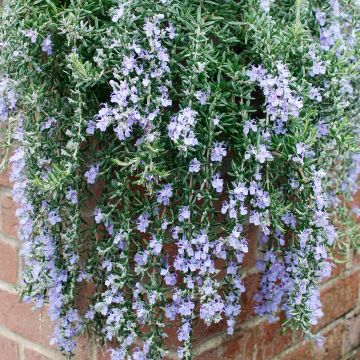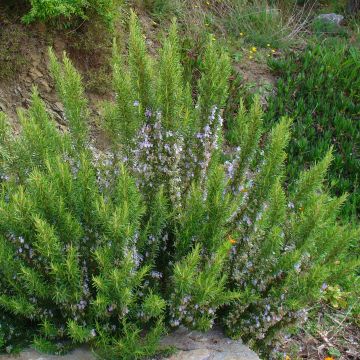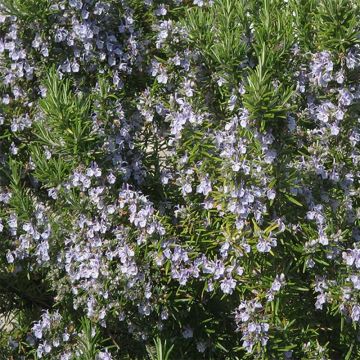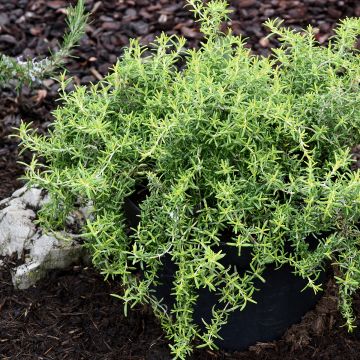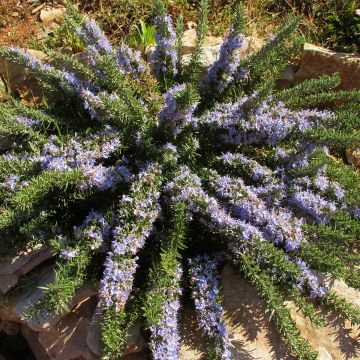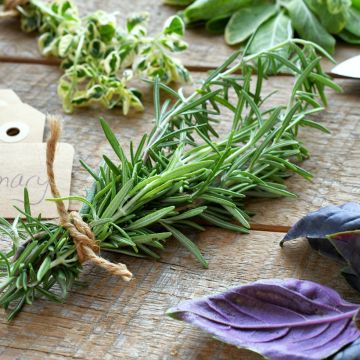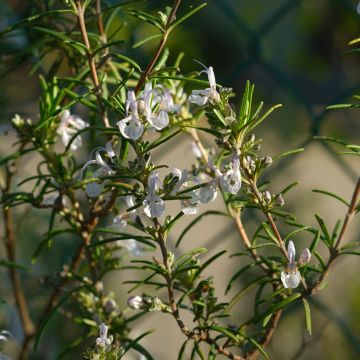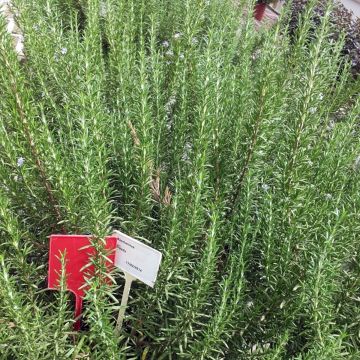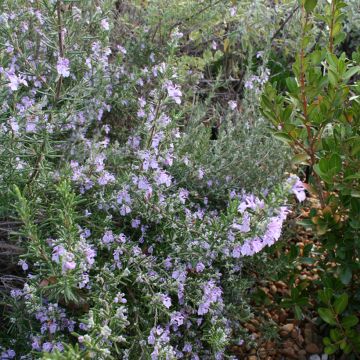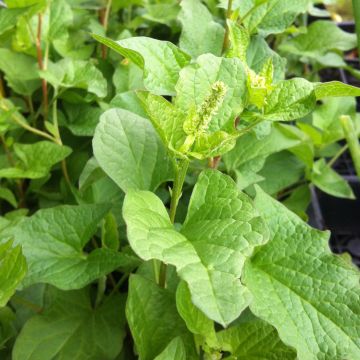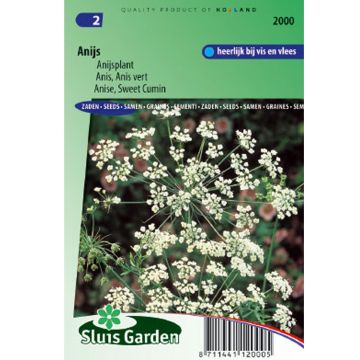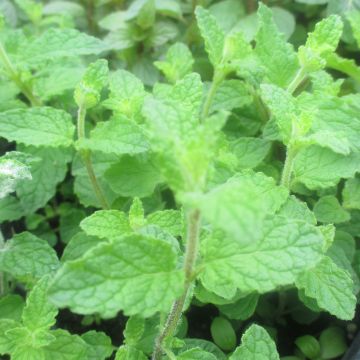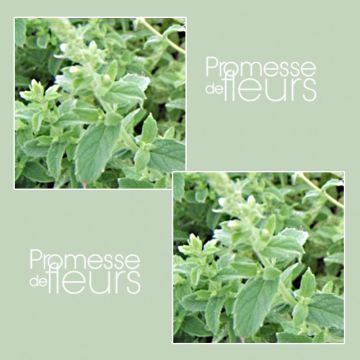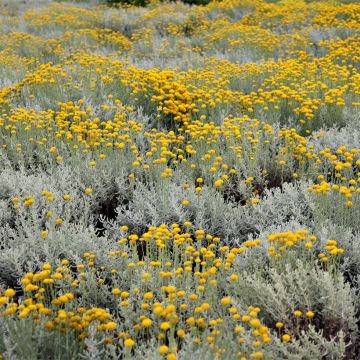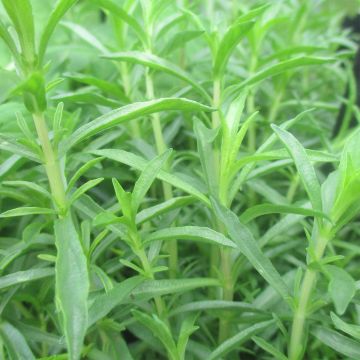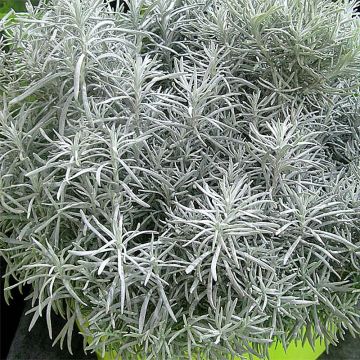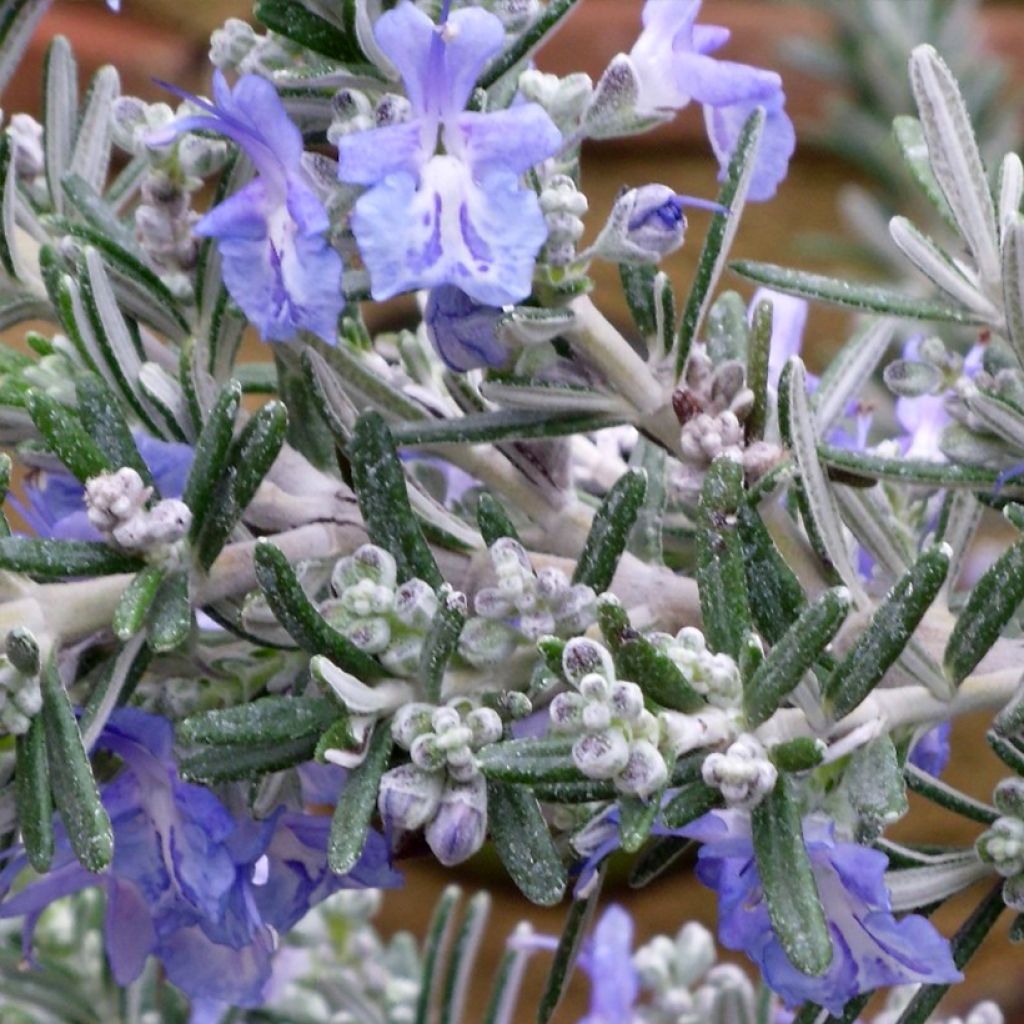

Rosmarinus officinalis Whitewater Silver - Romarin prostré
Rosmarinus officinalis Whitewater Silver
Rosmarinus officinalis Whitewater Silver
Rosemary
This item cannot be shipped to the selected country
Delivery charge from €6.90
More information
Delivery charge from €6.90
More information
Schedule delivery date,
and select date in basket
This plant carries a 24 months recovery warranty
More information
We guarantee the quality of our plants for a full growing cycle, and will replace at our expense any plant that fails to recover under normal climatic and planting conditions.
From €7.90 for pickup delivery and €6.90 for home delivery
Express home delivery from €8.90.
Does this plant fit my garden?
Set up your Plantfit profile →
Description
Rosmarinus officinalis 'Whitewater Silver' is an ornamental variety of rosemary with a prostrate and creeping habit. Its evergreen foliage is highly aromatic and has dark green colour with silver undersides, sparkling in the sunlight. In late spring, it is covered with small pale blue flowers enhanced with violet. It is moderately hardy and requires well-drained soil and full sun to thrive. It rewards you by enduring summer drought without any problem. Give it a place in a dry rockery or on top of a stone wall so that it can express its vigour and its lovely silhouette.
The Common Rosemary, called Rosmarinus officinalis, is a small shrub native to the Mediterranean basin belonging to the Lamiaceae family, which includes numerous medicinal and aromatic plants (mint, oregano, sage, lemon balm, basil, summer savory...). In addition to its multiple food and therapeutic properties, this plant has long been attributed the power to purify the air and ward off evil spirits. Around the Mediterranean, it was burned like incense. Depending on the region and its natural environment, it is locally differentiated and shows quite varied characteristics of hardiness, habit, and flowering.
Rosmarinus officinalis 'Whitewater Silver' is an subshrub that develops horizontally, densely covering the ground and cascading if given some height. It grows up to 30 to 40cm (12 to 16in) in height, and 90cm (35in) wide. Its flowering, which is a feature not to be overlooked, is pale, blue in color with violet accents. It lasts long in May and June, delighting pollinators. Its evergreen foliage is composed of small, shiny, narrow green leaves with silvered or wooly white undersides. Moderately hardy, down to about -10°C (14°F), it is both humidity and cold that can be harmful to it. Apart from requiring good drainage, it is otherwise undemanding, growing very well in poor and rocky soil, whether it is acidic, neutral, or alkaline.
Scenting the air and flavouring cuisine, Common Rosemary and its variants are interesting for quickly planting a dry garden, a rockery or simply an arid area where the soil lacks thickness. They provide a well-adapted solution in Mediterranean areas, but also in certain areas of the Atlantic coast where very sandy soil does not retain moisture. In rainy regions, at the limits of hardiness, it can also succeed if the soil conditions and its sunlight needs are well respected. In a rockery or as a ground cover for borders, it can be combined with other plants such as shrub salvias, polychrome spurge, or even Agave neomexicana for a more exotic theme. Do not hesitate to plant it alone as well, as it is truly magnificent when cascading along a wall.
Plant habit
Flowering
Foliage
Botanical data
Rosmarinus
officinalis
Whitewater Silver
Lamiaceae
Rosemary
Cultivar or hybrid
Other Rosemary
Planting and care
Rosemary is a plant perfect for poor and dry soil, even stony and chalky, well drained in winter. It grows in both acidic and limestone soils, being able to withstand a pH range of about 5 to 8, which is uncommon. The more well-drained the soil, the better the plant can withstand winter. The richer the soil, the faster the rosemary grows, and the worse it ages and thins out at the base.
It needs a sunny position. It is necessary to avoid watering the Rosemary plants in summer, as they can be sensitive to Phytophthora, a fungus that attacks the collar of the plant in conditions that are both warm and humid. You can prune lightly after flowering - it is even recommended - to shape your rosemary and maintain a compact and bushy habit.
Planting period
Intended location
Care
This item has not been reviewed yet - be the first to leave a review about it.
Herbs
Haven't found what you were looking for?
Hardiness is the lowest winter temperature a plant can endure without suffering serious damage or even dying. However, hardiness is affected by location (a sheltered area, such as a patio), protection (winter cover) and soil type (hardiness is improved by well-drained soil).

Photo Sharing Terms & Conditions
In order to encourage gardeners to interact and share their experiences, Promesse de fleurs offers various media enabling content to be uploaded onto its Site - in particular via the ‘Photo sharing’ module.
The User agrees to refrain from:
- Posting any content that is illegal, prejudicial, insulting, racist, inciteful to hatred, revisionist, contrary to public decency, that infringes on privacy or on the privacy rights of third parties, in particular the publicity rights of persons and goods, intellectual property rights, or the right to privacy.
- Submitting content on behalf of a third party;
- Impersonate the identity of a third party and/or publish any personal information about a third party;
In general, the User undertakes to refrain from any unethical behaviour.
All Content (in particular text, comments, files, images, photos, videos, creative works, etc.), which may be subject to property or intellectual property rights, image or other private rights, shall remain the property of the User, subject to the limited rights granted by the terms of the licence granted by Promesse de fleurs as stated below. Users are at liberty to publish or not to publish such Content on the Site, notably via the ‘Photo Sharing’ facility, and accept that this Content shall be made public and freely accessible, notably on the Internet.
Users further acknowledge, undertake to have ,and guarantee that they hold all necessary rights and permissions to publish such material on the Site, in particular with regard to the legislation in force pertaining to any privacy, property, intellectual property, image, or contractual rights, or rights of any other nature. By publishing such Content on the Site, Users acknowledge accepting full liability as publishers of the Content within the meaning of the law, and grant Promesse de fleurs, free of charge, an inclusive, worldwide licence for the said Content for the entire duration of its publication, including all reproduction, representation, up/downloading, displaying, performing, transmission, and storage rights.
Users also grant permission for their name to be linked to the Content and accept that this link may not always be made available.
By engaging in posting material, Users consent to their Content becoming automatically accessible on the Internet, in particular on other sites and/or blogs and/or web pages of the Promesse de fleurs site, including in particular social pages and the Promesse de fleurs catalogue.
Users may secure the removal of entrusted content free of charge by issuing a simple request via our contact form.

































